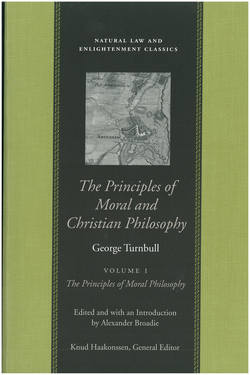Читать книгу The Principles of Moral and Christian Philosophy - George Turnbull - Страница 13
На сайте Литреса книга снята с продажи.
ОглавлениеTHE EPISTLE DEDICATORY
MY LORD,
I am very sure, that to one of Your truly liberal and virtuous cast of mind, the scope of this Treatise will be very agreeable: Which, to give the shortest view of it I can, is, by endeavouring to account for MORAL, as the great Newton has taught us to explain NATURAL Appearances, (that is, by reducing them to good general laws) to shew, that from what we see of perfectly wise and good administration at present with regard to man, as well as all other things constituting the same system, there is sufficient reason to conclude, that the same admirable order shall prevail for ever, and consequently that due care will be taken of virtue, in all its different stages, to all eternity.<ii>
No man, by having the highest opinion of virtue, and of the happiness accruing from rational exercises, and virtuous consciousness, was ever the less inclined to believe a future existence. On the contrary, it will ever be found, that as they who are entirely immersed in gross voluptuousness, and quite strangers to the pure joys virtue alone can give, are the least willing to think of a succeeding life; so they who having a strong sense of the supreme excellence of virtue, highly prefer to what is vulgarly called pleasure, the solid, unchanging bliss, with which they feel a well-regulated mind and conformable conduct, so unspeakably to exhilirate the soul even in severe outward distress, are the readiest to embrace and indulge that comfortable opinion and hope, which renders the cause of virtue completely triumphant. The ineffable satisfaction redounding from the exercises of virtuous affections, and the conscience of merit, is a truly divine reward: it comes from our Maker: it is of his appointment: and he who hath so constituted things, must love virtue; and that which he delights in, he will certainly promote to perfect happiness by the properest steps and methods.
We are well authorised to say, that a virtuous man is the Image of God; that he partakes of the divine nature. And the substantial, unfading<iii> happiness, which virtue creates, and that augments as it advances and improves, is to us a faint shadow of the divine all-perfect felicity resulting from no other source, but his absolute moral perfection, being of a kind with it: and it is a sure prognostick of that fulness of bliss, which must arise from virtue, when being by due culture brought to great perfection, it shall be placed in circumstances for exerting all its power and excellence suited to such an improved state of it.
Now, MY LORD, being convinced of the acceptableness of this Design to Your Lordship, when I offer the work to You, with a heart full of esteem, love and gratitude, as the best pledge of my sincere attachment I can present You with, suffer me but to say one truth: which is, that I never had the pleasure of conversing with Your Lordship, without not only being instructed, but, which is better, without feeling an accession of fresh vigor to that love of truth, liberty, mankind, virtue and religion; Your opinion of my sincere regard to which, procured and preserves me that place in Your friendship, which all who know You, proclaim merit: a friendship which is one of the greatest joys, as well as honours of my life; and to which I am deeply indebted on<iv> many accounts, which I am not at liberty to declare.
Tho’ no good man can despise merited praise, yet You shun it even from those whom You know to be incapable of flattering, through a jealousy and watchfulness almost peculiar to Yourself; lest Your mind, whose supreme delight is in doing good, should ever stand in need, in the smallest degree, of any other motive to act the best, the worthiest, the most generous part, besides a thorough-feeling of the excellence of so doing.
I am, My LORD, Your Lordship’s Most obedient Humble Servant, December, 19. 1739. GEORGE TURNBULL
